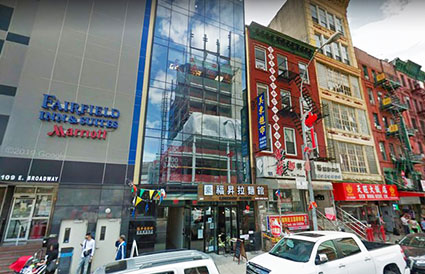by WorldTribune Staff, January 12, 2023
FBI counterintelligence agents last fall raided an office building in New York City’s Chinatown that contained an alleged covert Chinese police outpost, a report said.
The Chinatown outpost is one of more than 100 similar offices around the world suspected of carrying out police activities often involving overseas Chinese, without jurisdiction or diplomatic authorization, under orders from the Chinese Communist Party (CCP).

The raid was part of a criminal investigation launched by the U.S. attorney’s office in Brooklyn, The New York Times reported on Jan. 12.
Related: About China’s police stations worldwide and a restaurant in Seoul that doesn’t serve food, December 27, 2022
Safeguard Defenders, a watchdog that tracks disappearances of critics of the CCP, issued a report in September detailing claims that Chinese police are operating a program of foreign stations to harass regime critics abroad.
“It enables the Chinese state to reach out and silence dissidents, to spread fear and distrust among Chinese communities, and dissidents – despite having fled China – will not be able to continue their activism,” Jing-Jie Chen, one of the authors of the Safeguard Defenders report, told Radio Free Asia. “Foreign governments should take this issue seriously.”
Officials in Ireland, Canada and the Netherlands have called for the CCP to end police activities in their countries.
Netherlands-based Chinese dissident Lin Shengliang said he and other expats are concerned they are being tracked.
“I am extremely anxious about them,” he said. “There are no channels to report this, and there’s nothing we can do about it.”
China has a history of surveilling both dissidents and foreign citizens abroad.
Last month, the FBI arrested a Chinese national for allegedly harassing a pro-Democracy activist from China at a Boston college.
The Chinese Embassy in Washington claims the operatives who run the outposts are merely volunteers who are assisting Chinese nationals in tasks such as renewing their licenses in China.
“They are not police personnel from China,” embassy spokesperson Liu Pengyu said. “There is no need to make people nervous about this.”
However, Chinese state media reports reviewed by the New York Times show that Chinese officials have described the outposts as “overseas police service centers” that effectively collect intelligence and solve crimes.
Action . . . . Intelligence . . . . Publish
